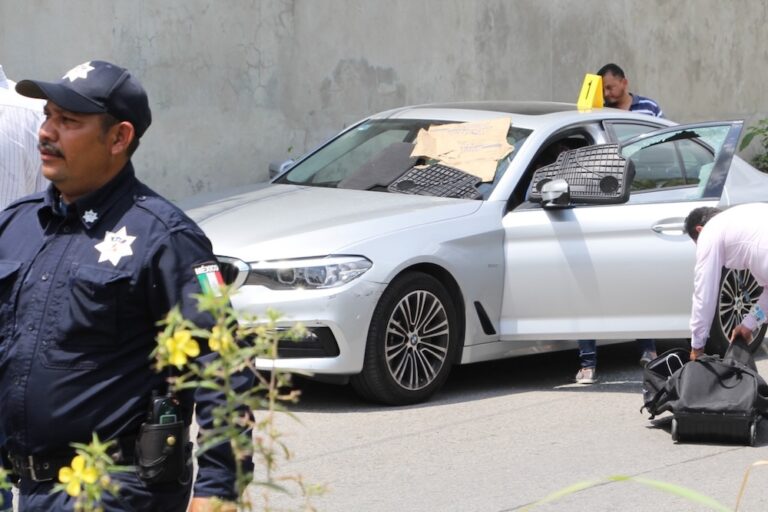ARTICLE 19 calls on the Government of Mexico and President Felipe Calderón Hinojosa to establish a committee to protect journalists and implement a comprehensive strategy to stop attacks on journalists and media workers.
(ARTICLE 19/IFEX) – 18 May 2009 – ARTICLE 19 calls on the Government of Mexico and President Felipe Calderón Hinojosa to establish a committee to protect journalists and implement a comprehensive strategy to stop attacks on journalists and media workers.
Violence against journalists is endemic in Mexico and the number of attacks has increased considerably in the last year. Self-censorship as a means of self-protection has become commonplace because the state has failed to take concrete steps to protect media workers and ensure the free and safe exercise of press freedom.
While aggressions perpetrated by organised criminal gangs receive the greatest attention and coverage, ARTICLE 19’s data show that the majority of cases and perpetrators involve state agents. International and local civil society has repeatedly denounced the silence of the authorities and their failure to take effective measures to prevent human rights violations in this regard.
In February 2009, Mexico was examined in the Universal Periodic Review by the United Nations Human Rights Council. Attacks on journalists and media workers, and the related culture of impunity that prevails, featured prominently in this process.
The Mexican State has an obligation to “prevent, investigate, and castigate” all violations of human rights that take place under its jurisdiction. According to the Vienna Declaration and Programme of Action, “there is a need for States and international organisations, in cooperation with non-governmental organisations, to create favourable conditions at the national, regional and international levels to ensure the full and effective enjoyment of human rights. States should eliminate all violations of human rights and their causes, as well as obstacles to the enjoyment of these rights.”
The fact that Mexico is currently considered one of the most dangerous countries to practise journalism in Latin America proves that the authorities are failing to comply with their international obligations to ensure an environment in which all citizens can enjoy full realisation of their rights.
ARTICLE 19 has gathered data from Mexican civil society and compiled a proposal submitted to the Ministry of the Interior and the Ministry of Public Security. Entitled “Committee of Risks Evaluation and Protection of Journalists”, the proposal emphasises the urgent need to establish a policy of prevention and protection for journalists and media workers.
ARTICLE 19’s proposal calls for stronger international cooperation and assistance, particularly from countries that have successfully combated violence against journalists. A good example is Colombia, with its programme for the protection of journalists.
The proposal further calls for a dialogue, involving all relevant stakeholders, to discuss the current situation and to establish channels of communication with Colombian counterparts.
In particular, ARTICLE 19 calls on the authorities to:
– Undertake an accurate diagnosis of the situation through consultation with Government, journalists and media workers, civil society and academia;
– Provide a space for inclusive and transparent discussion;
– Facilitate the process of consultation by providing access to adequate economic, human and political resources;
– Ensure adequate participation of all different parts of the media, including the commercial, community, independent, public service, university, indigenous and electronic media; and
– Involve the international community, such as international organisations and the United Nations High Commissioner for Human Rights, as active partners in the process.
ARTICLE 19 also recommends that the Government should establish a committee to protect journalists. In order to strengthen its impact, this committee should employ:
– Political, technical and operational independence;
– Active and permanent participation from civil society organisations;
– Sufficient capacity and economic and human resources to enable accurate and timely risk analysis and Effective protection mechanisms and measures coordination and collaboration between the federal and local levels of government;
– Clear operational guidelines to ensure using the broadest scope of protection measures;
– Channels to proactively and transparently disclose information on the committee’s activities and its rationale for evaluation; and
– A gender- and ethnic-sensitive approach on all matters, particularly in the implementation of protection measures.
ARTICLE 19 calls upon the Government of Mexico to take concrete steps to tackle the recurring freedom of expression violations taking place in the country. Impunity feeds on inaction and silence and sends the wrong message to perpetrators of such crimes.
ARTICLE 19 also respectfully calls upon President Felipe Calderón Hinojosa to adopt all of the necessary measures to provide the requisite resources to set up the committee to protect journalists. A comprehensive policy of prevention and protection will enable Mexico to put a stop to the attacks against freedom of expression and protect people’s lives.


